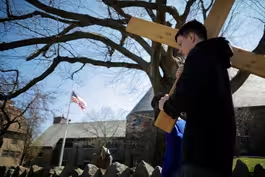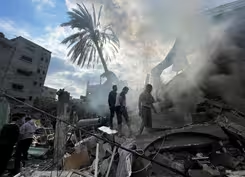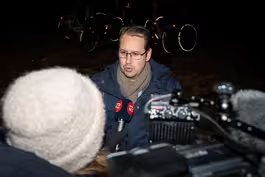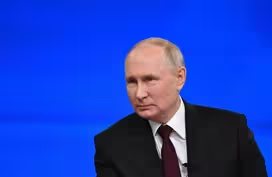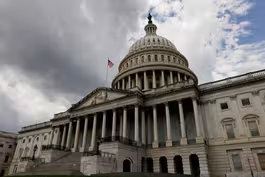
Gaza civilians face new threat with spread of disease
Clip: 12/14/2023 | 5m 55sVideo has Closed Captions
Gaza civilians caught in crossfire face new threat with spread of deadly diseases
The United Nations says Gaza’s health system has virtually collapsed, and Gazans who have survived daily bombings now face the risk of disease amid chronically overcrowded hospitals. William Brangham discussed that with Avril Benoit, the executive director of Doctors Without Borders in the U.S. The international humanitarian organization has been operating in Gaza since the start of the war.
Problems playing video? | Closed Captioning Feedback
Problems playing video? | Closed Captioning Feedback
Major corporate funding for the PBS News Hour is provided by BDO, BNSF, Consumer Cellular, American Cruise Lines, and Raymond James. Funding for the PBS NewsHour Weekend is provided by...

Gaza civilians face new threat with spread of disease
Clip: 12/14/2023 | 5m 55sVideo has Closed Captions
The United Nations says Gaza’s health system has virtually collapsed, and Gazans who have survived daily bombings now face the risk of disease amid chronically overcrowded hospitals. William Brangham discussed that with Avril Benoit, the executive director of Doctors Without Borders in the U.S. The international humanitarian organization has been operating in Gaza since the start of the war.
Problems playing video? | Closed Captioning Feedback
How to Watch PBS News Hour
PBS News Hour is available to stream on pbs.org and the free PBS App, available on iPhone, Apple TV, Android TV, Android smartphones, Amazon Fire TV, Amazon Fire Tablet, Roku, Samsung Smart TV, and Vizio.
Providing Support for PBS.org
Learn Moreabout PBS online sponsorshipWILLIAM BRANGHAM: The United Nations says Gaza's health system has virtually collapsed, and Gazans who have survived daily bombings now face the risk of disease amid chronically overcrowded hospitals.
Avril Benoit is the USA Executive director of the international humanitarian organization Doctors Without Borders, or MSF.
It has been operating in Gaza since the start of the war.
Avril Benoit, thank you so much for being here.
We are seeing reports that only a third of hospitals are still open in Gaza.
A U.N. official who just came back from Southern Gaza described the region as being on the brink of total chaos.
What has your own staff been reporting back to you about conditions there?
AVRIL BENOIT, Doctors Without Borders: William, the conditions have been harrowing almost since the beginning, with the shortage of fuel, the shortage of medicines, of medical equipment, the constant orders to evacuate hospitals that are fully functioning and overcrowded with patients in need of care.
We are seeing a lot of people coming in with catastrophic injuries, dead upon arrival in huge numbers, huge numbers of infections, people requiring major surgery and postoperative care that is just impossible under the current circumstances.
The hospitals are full.
And the medical teams are operating often with four or five people in a bed, many people having surgery at the same time.
When the operating rooms are full, they're doing it in the hallways, such a lack of anesthesia, such a lack of pain control medication, lack of bandages and basic sutures, basic supplies.
Many of the hospitals are just unable to cope.
WILLIAM BRANGHAM: And how do your staff go about trying to triage in circumstances like that?
AVRIL BENOIT: Well, it's a harrowing moral dilemma.
You take the triage training that you receive in medical school and subsequently from conflict medicine, where you're trying to determine, OK, who can we save with the shortfalls that we have in medicines, in anesthesia, in surgical supplies, who cannot be saved, and there are a lot of people who cannot be saved.
They will die of their infections.
They will die of their wounds.
And then you have those who are lightly injured, who will not be prioritized and are at very high risk of succumbing to what would normally be a fairly straightforward infection to deal with a small wound.
A few stitches, you send them on their way.
But, unfortunately, with the combination of the siege, people arriving so late because of the risk, the violence all around, we have attacks on hospital that have now become so routine that our doctors have been killed at the bedside of patients.
Just on Monday, we had a doctor -- a bullet pierced through the hospital from the outside.
There was sniper fire.
And this hospital has been surrounded by Israeli forces for many, many days now.
And he was shot and injured inside the hospital while treating a patient.
So, between all these combination of factors of people coming in extremely wounded, the risks to health care workers, and all the other pressures on the medical staff, that decision of who to save, who to treat is really -- I cannot express enough the heartbreak, the sense of utter failure of the medical humanitarian community, because we know what to do and we just can't do it.
It's impossible with the few resources, with the siege, with the constant pressures of the violence.
WILLIAM BRANGHAM: I mean, the IDF argues that the only reason they are approaching hospitals or fighting around hospitals is because they argue Hamas is operating inside those hospitals themselves.
Have your staff seen any evidence of that?
AVRIL BENOIT: Yes, these are very unconvincing arguments, because we're always worried about the presence of militants amidst civilians.
That concerns everyone.
And our staff have not seen evidence that hospitals are being used in the way that the Israeli government continues to allege to provide political cover for what can also be considered war crimes.
When you attack a hospital that's fully functioning, that's full of patients, that's full of people finding refuge, civilians, families, children, there is no justification for attacking and destroying a hospital's capacity to treat people.
WILLIAM BRANGHAM: I mean, the U.N. General Assembly two days ago voted to call for another humanitarian cease-fire.
Absent that happening, how long do you think MSF can continue operating under these conditions?
AVRIL BENOIT: We ask ourselves that hour by hour, because there are moments when we really question whether Doctors Without Borders, MSF, can continue.
Sometimes, it is so difficult even for patients to reach the health facilities, the hospitals that are managing to keep the doors open.
And, sometimes, the doors are closed because there's a -- they're surrounded by armed forces and there are snipers all around.
There may come a time -- if the violence and the indiscriminate violence against civilians continues to the extent that it is, we really question how long we can hang on.
And we don't want to leave.
We would like to be able to scale up.
People have a right to humanitarian assistance.
And because of the conduct of the war, this indiscriminate violence, the siege, it's imperative that we get a cease-fire, so that, at the very least, we can start giving civilians an opportunity to survive this horror.
WILLIAM BRANGHAM: All right, Avril Benoit of Medecins Sans Frontieres, Doctors Without Borders, thank you so much for being here.
AVRIL BENOIT: Thank you.
How some evangelicals are combating political radicalization
Video has Closed Captions
Clip: 12/14/2023 | 8m 4s | How some evangelical leaders are combating political radicalization in their congregations (8m 4s)
Israel says war will continue 'more than several months'
Video has Closed Captions
Clip: 12/14/2023 | 3m 14s | Israel says Gaza war will continue 'more than several months' amid pressure for cease-fire (3m 14s)
News Wrap: Authorities arrest 7 accused of plotting attack
Video has Closed Captions
Clip: 12/14/2023 | 3m 25s | News Wrap: Authorities arrest 7 accused of plotting Europe terror attack (3m 25s)
Putin vows to press on with Ukraine invasion despite losses
Video has Closed Captions
Clip: 12/14/2023 | 9m 4s | Putin vows to press on with Ukraine invasion despite heavy Russian losses (9m 4s)
Real estate commission challenges could shake housing market
Video has Closed Captions
Clip: 12/14/2023 | 8m 49s | Lawsuits challenging real estate commission could shake up housing market (8m 49s)
Rush's Geddy Lee reflects on music and life in new memoir
Video has Closed Captions
Clip: 12/14/2023 | 7m 24s | Rush frontman Geddy Lee reflects on his music and life in a new memoir (7m 24s)
What needs to happen to pass Ukraine aid, border funding
Video has Closed Captions
Clip: 12/14/2023 | 5m 59s | What needs to happen for Congress to pass funding for Ukraine aid and border security (5m 59s)
Providing Support for PBS.org
Learn Moreabout PBS online sponsorshipSupport for PBS provided by:
Major corporate funding for the PBS News Hour is provided by BDO, BNSF, Consumer Cellular, American Cruise Lines, and Raymond James. Funding for the PBS NewsHour Weekend is provided by...
